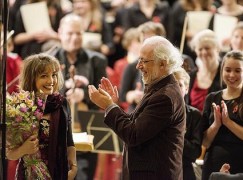BBC paper attacks TV censorship of new music
mainWhen we challenged the BBC last week over the absence of its own commissions from television relays of the Proms, what we got in response were overlong emails from hyper-anxious press officers, offering to ‘explain’ the corporation’s position, as well as a meeting with one of its supernumerary executives.
Lord, give us strength…
Now, however, Radio Times has joined us on the barricades
Radio Times stands in relation to the BBC as Pravda to the Kremlin, or Opera News (in the past) to the Met. It is a house organ.
So when a reviewer in Radio Times complains (below) about the elimination of new music from TV, it’s a sign all is not well at BBC Music under its new ‘inclusive’ leadership.
RT: A shame that BBC4 is omitting Roxanna Panufnik’s Three Paths to Peace. It doesn’t fit their masterwork package, but a thoughtful work by a British composer – both living and female (pictured) – demands a wider audience.






Many years ago, Sir Peter Maxwell Davies described Radio Times to me as an “obscene publication”. I now see what he meant. It has become a tawdry celebrity rag with a ludicrous editorial policy. A certain Patrick Mulkern writes about new music on the rare occasions that it is mentioned (normally the Prom season). I only buy it because it is the sole listings magazine which lists radio programmes.
Wagner: ‘Kinder, schafft etwas Neues’ (Children, create something new). Mahler: “Tradition heisst Schlamperei’ (Tradition means sloppiness) BBC: Uhhh, what does this mean? (or something about it) Tralala!
Given the average qualities of new music as presented in public space today, nowadays these composers would have said something quite different.
Wagner: ‘Kinder, shafft etwas Traditionelles.’
Mahler: ‘Neues ist Schlamperei!’
Calling something censorship which is not censorship is an insult to people who have suffered for speaking out against authoritarian regimes which engage in real censorship. Right or wrong, this is merely an editorial decision.